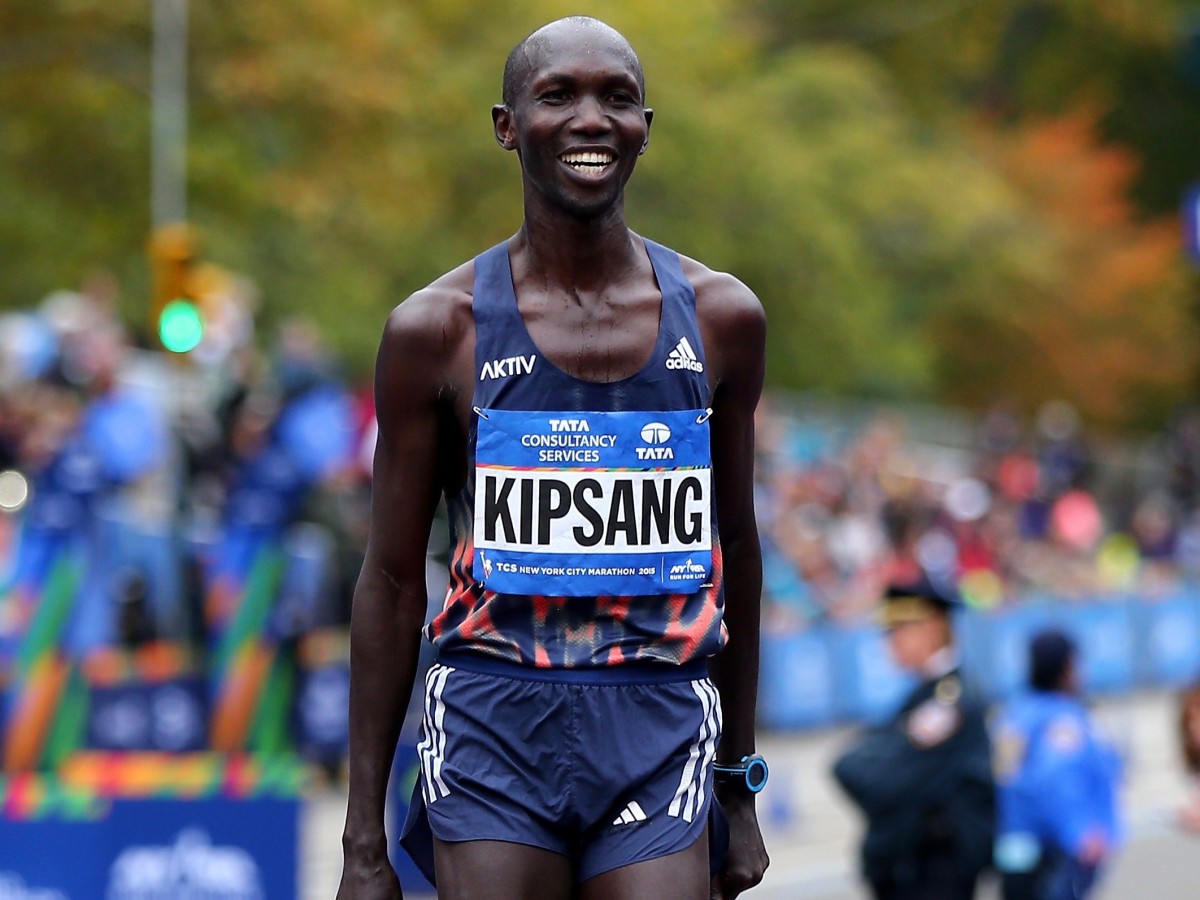Wilson Kipsang Discusses His Quest for the World Record at the 2017 Berlin Marathon

BERLIN — Wilson Kipsang has done enough over the past seven years to be considered one of the greatest marathoners of all-time. He set a world record of 2:03:27 at the 2013 Berlin Marathon, which stood for a year before it was broken by his compatriot Dennis Kimetto. Kipsang has a good chance of taking back the record during Sunday’s Berlin Marathon.
Kipsang, 35, holds the fastest marathon time of 2017 with his 2:03:58 victory in February’s Tokyo Marathon. He faces arguably the strongest field assembled for a marathon with Olympic champion Eliud Kipchoge coming into the race after running 2:00:25 in Nike’s Breaking2 attempt to run the first sub-two hour marathon. Kenenisa Bekele, who beat Kipsang in last year’s Berlin Marathon, returns to defend his title.
SI sat down with Kipsang on Friday afternoon in Berlin to discuss his hopes for the race, thoughts on the Breaking 2 attempt, the G.O.A.T. debate and more.
SI: Two days to go, how are you feeling?
Wilson Kipsang: I’m feeling good. Ready to go.
SI: This is your third time running the Berlin Marathon, you won and set a world record in 2013. You ran even faster last year but finished second. Isn’t that a little bit weird?
WK: Yeah, but no so much because [Kenenisa Bekele] didn’t break the world record. It would have been more disappointing if he won and broke the world record.
SI: What happened at the end and how did you feel in the last few kilometers?
WK: It was only 10 seconds. I missed my water bottle at 40K and he took his bottle. Toward the end, I think he was a bit stronger than me. That was the difference.
SI: You’ve been one of the most consistent marathoners in history and this is your seventh year running the 26.2 mile distance. What’s been the key to longevity? Because you ran some fast ones, but then you took 2014 and 2015 to focus on winning races like New York that are not as fast. Was that on purpose to give yourself a break?
WK: In athletics, you face challenges like any other part of life. There are some races that you can go out and run fast and then there’s others that you can’t. You just have to do your best to win in those. I found that my performance came down a bit because of the running up and down. I ran a world championships and it was too hot and it does strange things to your body. I find that because I picked the right race, I came back. Berlin was a success last year. I ran a course record in Tokyo of 2:03:58. It’s coming.
SI: You’ve said you want to run a world record here. Eliud Kipchoge says the same thing so how do you go about training to run 2:02:56.
WK: As someone who has broken the world record before, you just have to know the number of seconds that you’re away. I’m only 16 away. So, I’ve been focusing on adjusting my training to those 16 seconds. I pretty much used the same program that I did to run two hours and 13 seconds but made some minor adjustments to the closing speed and endurance. Everything is important. Working on my strength, speed and enough rest. If you increase enough little things, you’ll find you’re closer.
SI: Did you watch Eliud Kipchoge in the Breaking2 project and what did you think?
WK: I did. It was a nice race and I wish to be a part of such a competition to see the best that I could run.
SI: So someday, if adidas staged its own project, you’d like to participate?
WK: Oh yeah. Yeah. Absolutely.

SI: The time shows us that we’re maybe 25 seconds away from a sub-two hour marathon in optimal conditions. In the past few years, you thought that we were a few years away from it. What are your thoughts now?
WK: In recent years, I’ve learned more about the advances in technology whether it’s the course or shoes. When the conditions are perfect, it is possible for someone to run sub-two. Under normal conditions like Sunday, we have three pacemakers, sometimes ups and downs and wind, it’s not that easy. There’s only a couple of us who could maybe do it under perfect conditions. We saw it with his race when he was the only one left that really pushed it. Eliud pushed so hard. He had nothing left and that was the maximum.
SI: You’re a veteran of this sport but sometimes train with younger guys in Kenya. We have two models of success on display for the marathon. There’s someone like you who went straight to the roads and cashed in on the halves and marathons. Then there’s someone like Kipchoge who ran 10 years on the track and now wants to run 10 years on the roads. Both have been successful. What’s your recommendation to the kids that you train with in Kenya?
WK: My preference for the younger generations is that it’s good for them to build up especially on the track. Run some track and cross country but most importantly take the time to know your build-up. Develop some speed. If you want to come to the marathon, then start off with some road races at 10K, 15K or the half. I learned that in my time from 2007 to 2010. I ran 27 in the 10K. I ran under 60 in the half. By the time I went into my first marathon, I had that speed and endurance. I just thought that in order to compete for Kenya in the Olympics and World Championships, it’s not easy.
SI: Are you ever curious of what you could’ve done on the track?
WK: I realized pretty early on that I’m not fast on the track compared to Bekele and Kipchoge. They ran really well on the track. Running world records especially takes its toll on the body. Bekele had to take a break from the track before training and preparing for the roads. If he would’ve continued immediately, he would not have been as successful. That time off was important.
SI: In Tokyo, you wore the adizero Sub2 marathon shoe and you also drank Maurten – the special drink that everyone has been winning marathons with. What did you think of the products and how big of a difference did it make?
WK: If you get a very nice shoe, you can improve upon your time by like a minute. If you get a good course then there’s another minute. You saw it in Tokyo. The course record was 2:05 and I ran 2:03 so that’s pretty much two minutes. Add in the drink and that’s a little more time that’s taken off.
SI: Didn’t you miss a bottle at the end?
WK: I did. (Laughs)
SI: What happened? Because that’s back-to-back marathons now where you haven’t been lucky at that 40K station.
WK: At the time when I was approaching 40K, I was in my top speed. If you’re concentrated so much, you can forget to pass because I was running at a very high speed. I got distracted but you don’t want to disrupt that rhythm and pace. If you do that, then it’s not that easy to get back to where you were. When I broke the world record in 2013, I didn’t take the bottle at 40K.
SI: Now you’re just doing this on purpose for us.
WK: I thought that it could cost me anywhere from five to 10 seconds in the end. To chase those seconds, I just kept going. But actually, I really wanted to take that drink in Tokyo. Maybe it would’ve given me a little more power in those last two kilometers. That could have been like a 2:03:50.
SI: You have an Olympic medal, you’ve won London, New York, Tokyo and Berlin. How much longer do you think you can keep running the marathon?
WK: As long as it takes. I really want to run as long as it takes. The time comes as a gift of the training. You race, you race, you race until you feel that you’re tired. I really believe that my body has some years to come.
SI: Sunday’s race. It’s you, Kenenisa and Eliud. Three of the fastest ever. Whoever wins and if they set the world record, are they the greatest ever?
WK: I don’t really think so. I always say that each and every race is different. Today, you could go into a race and not feel good so I’ll beat you. Next time we meet, if I’m not feeling well or if I’m not in my top shape then you beat me. Each and every time, there’s a different result. The three of us were in London before. Eliud won and I was second. We raced in 2013, I was first and Eliud was second. It keeps on changing. The feeling and preparation for this one could be different. If you put the three of us on the same starting line next year, you could see a different result than this year. I don’t see this as a battle for supremacy. You can’t compare our careers right now. I’ve done 16 marathons and I’ve run eight under 2:05. These guys have only done it four or five. If they run the world record, I don’t think they could say they’re faster than Kipsang. Maybe at the end of their careers, we can analyze who has done better, who has won medals and whatever. For now,it’s just a race. We just accept the results and if we have a re-match then we’ll see what happens.
SI: I’m racing on Sunday too but you don’t have to worry about me.
